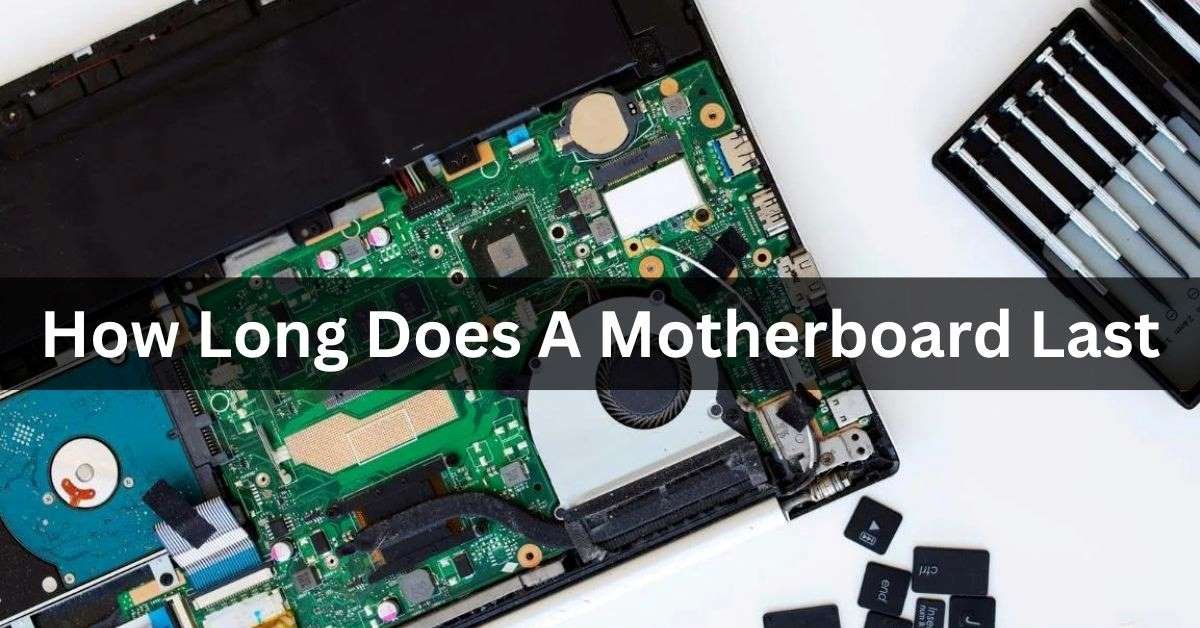In the world of computer hardware, the motherboard is like the brain, connecting different parts and making sure they work well. It’s really important and decides how well your computer works and how long it will last.
A motherboard typically lasts around 5 to 10 years, but it can vary based on usage, quality, and care. Regular maintenance and proper handling can extend its lifespan.
In this article, we will discuss the lifespan of the motherboard or How Long Does A Motherboard Last.
Factors Influencing the Longevity of Motherboards:
Several factors play a crucial role in determining the lifespan of a motherboard:
1. Quality of Components
The quality of materials and components used in manufacturing greatly influences the durability of a motherboard. High-quality capacitors, resistors, and other electronic components tend to last longer and withstand wear and tear better than lower-quality counterparts.
2. Environmental Factors
Environmental conditions such as temperature, humidity, and dust levels can impact the lifespan of a motherboard.
Exposure to extreme temperatures or moisture can lead to corrosion and component failure over time. It’s essential to keep computers in a well-ventilated, dust-free environment to minimize the risk of damage.
Read: Can Old Motherboard Support New GPU – Ultimate Guide – 2024
3. Usage Patterns
The way a motherboard is used also affects its lifespan. Continuous heavy usage, such as running resource-intensive applications or overclocking, can put extra strain on the components, potentially shortening the lifespan of the motherboard.
Typical Lifespan of Motherboards:
On average, a well-maintained motherboard can last anywhere from 5 to 10 years or more. However, this lifespan can vary significantly depending on the factors mentioned above.
Read: Is All Ram Compatible With All Motherboards – Complete Guide
Signs of a Failing Motherboard:
Several warning signs indicate a motherboard may be nearing the end of its lifespan. These include frequent crashes, random reboots, unexplained hardware failures, and unusual behavior such as erratic mouse movements or keyboard input.
Tips to Prolong Motherboard Lifespan:
While the lifespan of a motherboard is ultimately determined by various factors, there are steps users can take to prolong its longevity:
Read: New Motherboard Wifi Not Working – Ultimate Guide – 2024
1. Proper Maintenance and Cleaning
Regularly cleaning the motherboard and other internal components can help prevent dust buildup and reduce the risk of overheating. Use compressed air to blow dust away from the motherboard and ensure proper airflow within the computer case.
2. Monitoring Temperatures
Monitoring the temperature of the motherboard and CPU can help identify potential overheating issues before they cause damage. Use monitoring software to keep track of temperature levels and address any abnormalities promptly.
3. Avoiding Overclocking
While overclocking can provide a performance boost, it also puts additional stress on the motherboard and other components. Avoiding overclocking or keeping it within safe limits can help extend the lifespan of the motherboard.
Read: Do Motherboards Come With Screws – Ultimate Guide – 2024
Ways To Increase The Motherboard’s Life:
To increase a motherboard’s lifespan, ensure proper ventilation and cooling, avoid electrical surges, regularly update BIOS firmware, handle components carefully, and keep the system clean from dust and debris.
Read: Are All Motherboards The Same Size – Ultimate Guide – 2024
What Should I Do If My Motherboard Is Fried?
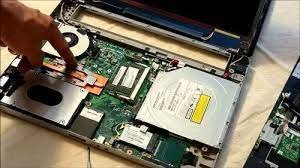
If your motherboard is fried, first check for warranty coverage. If not covered, consider replacing it. Ensure the rest of your components are unharmed, and take preventive measures to avoid future damage.
Read: Can You Use 8 Pin 4 Pin Motherboard – Complete Guide – 2024
Most motherboards won’t Die, They Just Won’t Do What You Need Anymore.
Many motherboards don’t completely fail; rather, they may become incompatible with newer hardware or fail to meet performance needs. Upgrading or replacing them can resolve these issues.
Pc motherboard lifespan?
A PC motherboard usually lasts about 5-10 years. Proper care, like keeping it clean and cool, can make it last longer. Quality parts and avoiding power surges also help extend its life.
How long motherboard last?
A motherboard usually lasts between 5 to 10 years. Taking good care of it, like keeping it clean and cool, can help it last longer. Quality components and avoiding power surges also help.
How long do mobos last?
Mobos, or motherboards, generally last 5 to 10 years. Good care, like keeping them clean and cool, helps them last longer. Using quality parts and avoiding power surges can also extend their lifespan.
How long do laptop motherboards last?
Laptop motherboards usually last between 4 to 8 years. Proper care, like keeping the laptop cool and clean, can help them last longer. Using quality parts and avoiding physical damage can also extend their lifespan.
How long do pc motherboards last?
PC motherboards typically last 5 to 10 years. Proper care, such as keeping them clean and cool, helps them last longer. Using good quality parts and protecting them from power surges can also extend their lifespan.
How long does a laptop motherboard last?
A laptop motherboard generally lasts 4 to 8 years. Proper care, like keeping the laptop cool and free from dust, can make it last longer. Using good quality parts and avoiding physical damage also help extend its lifespan.
Asus motherboard lifespan?
Asus motherboards usually last 7 to 10 years. Proper care, such as keeping them clean and cool, helps them last longer. Using high-quality parts and protecting them from power surges can also extend their lifespan.
How long does CMOS battery (3V) on a motherboard last?
A CMOS battery (3V) on a motherboard usually lasts 3 to 5 years. Factors like usage and temperature can affect its lifespan. Replacing the battery is simple and helps keep your computer’s settings and clock accurate.
How Long Should This Motherboard last?
This motherboard should last about 5 to 10 years. Proper care, like keeping it clean and cool, helps it last longer. Using high-quality parts and avoiding power surges can also extend its lifespan.
Can you just replace the motherboard?
Yes, you can replace the motherboard, but it can be difficult. Ensure compatibility with other parts like the CPU and RAM. Backup your data and be ready to reinstall the operating system and drivers.
Can I use my old hard drive with a new motherboard?
Yes, you can use your old hard drive with a new motherboard, but ensure compatibility with the new motherboard’s connections (e.g., SATA). You may need to reinstall the operating system and drivers for optimal performance.
Will I lose data if I replace my motherboard?
Replacing your motherboard may not necessarily cause data loss, but it’s still advisable to backup your important files beforehand. Sometimes, reinstalling the operating system is necessary, which could lead to data loss if not backed up.
The Lifespan of Motherboards: How long can you expect them to last?
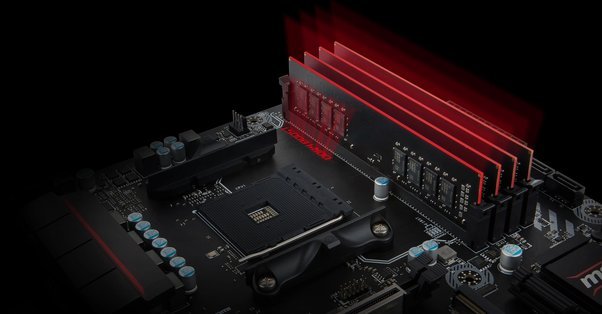
Motherboards typically last 5 to 10 years or more with proper care. However, lifespan varies based on usage, quality, and technological advancements. Regular maintenance and upgrades can extend their longevity.
Signs and Symptoms: If your Motherboard is dying?
Signs of a dying motherboard include failure to boot, random crashes, unusual error messages, and hardware peripherals not working correctly. These symptoms often indicate underlying issues with the motherboard.
Science Behind Motherboards LifeSpan:
The lifespan of motherboards depends on factors like component quality, usage, and environmental conditions. Proper cooling, handling, and maintenance can extend their lifespan. Technological advancements also play a role in determining how long they remain relevant.
How Long Do Motherboards Last?
Motherboards typically last 5 to 10 years or more with proper care. Factors like usage, maintenance, and quality affect lifespan. Regular cleaning, avoiding overheating, and gentle handling can help prolong a motherboard’s life.
Do Motherboards Really Have A Shelf Life?
Yes, motherboards do have a shelf life, but it varies based on usage, quality, and environmental factors. With proper care and maintenance, they can last for several years.
Common Myths and Misconceptions about Motherboards?
Common myths about motherboards include thinking they don’t affect performance, that all motherboards are the same, and that upgrading them always boosts speed. Understanding their role can dispel such misconceptions.
How to Extend the Life of Your Motherboard? Tips and Tricks to Extend its Life?
To extend your motherboard’s life, ensure proper cooling, avoid power surges, regularly update firmware, handle components gently, keep the system clean, and use quality components. Regular maintenance and careful handling are key.
How Can I Increase My Motherboard’s Lifespan?
You can increase your motherboard’s lifespan by ensuring proper ventilation and cooling, avoiding power surges, updating firmware regularly, handling components gently, keeping the system clean, and using quality components. Regular maintenance is essential.
Read: Do Motherboards Have Bluetooth – Ultimate Guide – 2024
How Long Do PC Parts and Components Last?
PC parts and components typically last several years, with variations depending on usage, quality, and maintenance. Common lifespans range from 3 to 10 years, but proper care can extend longevity.
What Can Shorten A Motherboard’s Lifespan?
Several factors can shorten a motherboard’s lifespan, including excessive heat, power surges, poor ventilation, physical damage, improper handling, dust accumulation, and using low-quality components. Regular maintenance helps mitigate these risks.
What is the lifespan of a gaming motherboard?
A gaming motherboard typically lasts around 3 to 5 years, but this can vary depending on usage, quality, and advancements in technology. Regular maintenance helps prolong its lifespan.
How Long Does A Motherboard Last On Average Before It Loses Performance?
On average, a motherboard lasts about 5 to 7 years before it starts to lose performance due to wear and tear, technological advancements, and evolving software requirements. Regular maintenance can help extend its lifespan.
How Long Would A Motherboard Last?
A motherboard can last 5 to 10 years or more with proper care. However, factors like usage intensity, environmental conditions, and technological advancements can affect its lifespan.
How often should you replace your motherboard?
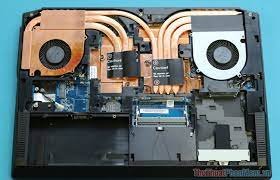
You typically don’t need to replace your motherboard often unless it’s malfunctioning or incompatible with new components. Motherboards can last 5-10 years or more with proper care and maintenance.
What are the symptoms of dead Motherboards?
Symptoms of a dead motherboard include failure to power on, no display output, beeping sounds during startup, random crashes, and failure to detect connected devices like RAM or storage.
Do motherboards go bad over time?
Yes, motherboards can degrade over time due to various factors like electrical surges, heat, and component wear. However, with proper care, maintenance, and handling, their lifespan can be extended.
read: What Graphics Cards Are Compatible With My Motherboard – Complete Guide!
How long does a motherboard last for gaming?
A gaming motherboard can last around 5 to 10 years with proper care and maintenance. However, it depends on usage, quality, and technological advancements in gaming hardware.
How long does RAM last?
RAM typically lasts for many years under normal usage conditions. However, its lifespan can vary based on usage intensity and quality. Generally, RAM can last 5-10 years or more.
How long does a motherboard battery last?
The motherboard battery, also known as the CMOS battery, typically lasts around 3 to 5 years. Its lifespan can vary based on factors like usage and environmental conditions.
Gigabyte motherboard lifespan?
The lifespan of a Gigabyte motherboard, like other motherboards, is typically around 5 to 10 years. However, it can vary depending on usage, maintenance, and the quality of the components.
How long does a CPU last?
A CPU can last for many years, often 5 to 10 years or more, depending on usage, temperature management, and other factors. However, technological advancements may prompt upgrades before they fail.
How long do power supplies last PC?
Power supplies for PCs typically last around 5 to 10 years. However, their lifespan can vary based on factors such as usage patterns, quality of components, and environmental conditions.
Laptop motherboard lifespan?
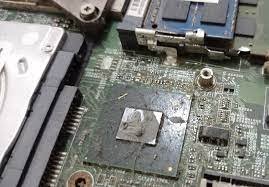
The lifespan of a laptop motherboard is usually around 3 to 5 years. However, it depends on factors like usage, environmental conditions, and the quality of the motherboard.
FAQs:
1. What is the lifetime of a PC motherboard?
The lifetime of a PC motherboard is typically around 5 to 10 years. However, this can vary based on factors like usage, maintenance, and the quality of the motherboard itself.
2. Do computer motherboards go bad over time?
Yes, computer motherboards can go bad over time. They might stop working properly due to factors like overheating, electrical issues, or simply wearing out from regular use.
3. How long will a motherboard last?
A motherboard can last for about 5 to 10 years if you take good care of it. It’s like the computer’s heart, but it can stop working after a while.
4. How many years will a motherboard last?
A motherboard can last around 5 to 10 years with proper care and usage. It’s like the heart of a computer, but it can wear out over time due to various factors.
5. Are high-end motherboards worth it?
High-end motherboards can be worth it for serious gamers or professionals needing advanced features like overclocking or multiple GPUs. For regular users, mid-range options often suffice.
6. When you upgrade your motherboard, are you really just building a new PC?
When you upgrade your motherboard, it’s like giving your computer a new heart. Everything else stays the same, but the central part changes to improve performance or add features.
7. Do motherboards wear out?
Yes, motherboards can wear out over time due to factors like heat, electrical surges, and physical damage. However, with proper care and maintenance, their lifespan can be extended.
8. Does motherboard size matter when building a gaming PC?
Yes, motherboard size matters for building a gaming PC. Larger motherboards offer more expansion slots and features, while smaller ones are more compact but may have fewer slots for components.
9. If a motherboard is damaged, can it be replaced by just replacing the motherboard, or does the entire system need to be reinstalled (hard disk, RAM, etc.)?
If a motherboard is replaced, typically only the motherboard needs swapping. However, if there are significant changes in the motherboard model or compatibility issues, reinstalling the operating system and drivers might be necessary.
10. What truly makes a motherboard reliable/durable?
A reliable motherboard depends on good quality components, solid construction, and effective heat management. Proper handling, regular maintenance, and compatibility with other hardware also contribute to its durability and longevity.
Conclusion:
In conclusion, a motherboard acts as a computer’s backbone, impacting its functionality and durability. Depending on factors such as quality, usage, and maintenance, motherboards typically endure for 5 to 10 years. Regular upkeep, temperature monitoring, and refraining from overclocking are key to prolonging their lifespan. With proper care, motherboards can reliably support computing needs over extended periods.
